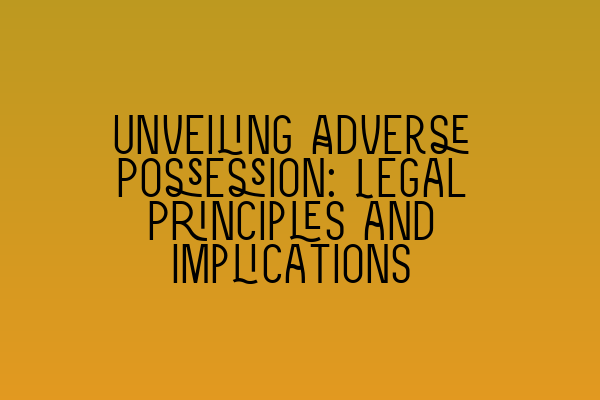Unveiling Adverse Possession: Legal Principles and Implications
Welcome to the SQE Property Law & Land Law blog, where we strive to provide comprehensive insights into various legal topics. In today’s post, we will unveil the concept of adverse possession, exploring its legal principles and the implications it holds. It is crucial for any aspiring solicitor or legal professional to understand this crucial aspect of property law. So, let’s dive right in!
What is Adverse Possession?
Adverse possession refers to a legal doctrine that allows an individual to claim ownership of a property by occupying it continuously for a specified period, typically ranging from 10 to 30 years, depending on the jurisdiction. This means that if someone occupies a property for the required period without the owner’s permission, they can potentially acquire legal title to the property.
Essential Elements of Adverse Possession
To establish a claim of adverse possession, certain key elements must be fulfilled. Let’s examine them in detail:
1. Actual Possession: The claimant must physically occupy the property. It is crucial to note that occasional or sporadic use of the property is insufficient to meet this requirement. The possession must be continuous, exclusive, and evident.
2. Hostile Possession: The possession must be without the owner’s consent. It is not necessary for the claimant to have a malicious intent or animosity towards the true owner. Hostility, in this context, simply means possessing the property as if it were one’s own.
3. Open and Notorious: The possession must be open and obvious to anyone who inspects the property. This ensures that the true owner is aware of the adverse possession.
4. Continuous Possession: The occupation must be uninterrupted throughout the statutory period. Short breaks in possession may not necessarily invalidate the claim, but they can affect the overall continuity.
5. Exclusive Possession: The claimant must possess the property exclusively, excluding the true owner or others from using or occupying it.
Implications of Adverse Possession
Adverse possession comes with various legal implications, both for the claimant and the true owner. Let’s explore them:
1. Acquisition of Title: If the claimant successfully establishes adverse possession, they can acquire legal title to the property. This can be highly consequential, as the true owner may lose their rights and entitlements.
2. Defending Title: On the other hand, if the true owner challenges the adverse possessor’s claim, they must endeavor to protect their title. This can involve initiating legal proceedings to remove the adverse possessor and asserting their ownership rights.
3. Limitations Period: Adverse possession undermines the traditional principle of ownership, which emphasizes the importance of active possession and control. The limitations period sets a time limit within which the true owner must take legal action to protect their property rights.
4. Legal Certainty: Adverse possession provides a mechanism for resolving disputes arising from long-standing possession. It promotes legal certainty by granting legal recognition to long-term occupiers, effectively transferring the title to them.
At SQE Property Law & Land Law, we prioritize providing comprehensive knowledge about property law and related subjects. If you want a deeper understanding of this topic and other areas of law, we encourage you to explore our SQE 1 Practice Exam Questions or SQE 1 Practice Mocks FLK1 FLK2 resources. These materials will help you hone your legal skills and broaden your understanding of property law.
Additionally, if you’re preparing for the SQE 2 or SQE 1 exams, our SQE 2 Preparation Courses and SQE 1 Preparation Courses are designed to equip you with the knowledge and expertise necessary to excel in these assessments. Stay up to date with the latest SRA SQE Exam Dates as you plan your journey to becoming a qualified solicitor.
In Conclusion
Adverse possession is a complex legal concept with far-reaching implications for both claimants and true owners. Understanding its principles and ramifications is essential for any aspiring solicitor or legal professional. We hope this blog post has shed light on this topic and its significance within property law.
Remember to stay connected with SQE Property Law & Land Law for more engaging and informative content. Keep exploring our blog, practice exam questions, and preparation courses to enhance your legal knowledge and succeed in your legal career!
